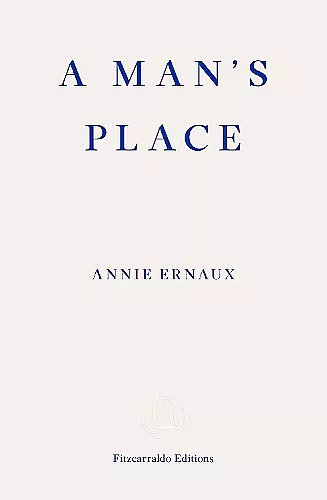A Man's Place – WINNER OF THE 2022 NOBEL PRIZE IN LITERATURE
A profound exploration of family, labor, and identity
Annie Ernaux author Tanya Leslie translator
Format:Paperback
Publisher:Fitzcarraldo Editions
Published:28th Oct '20
Should be back in stock very soon
This paperback is available in another edition too:
- Paperback£7.99(9781804270547)

Annie Ernaux's A Man's Place explores her father's life, revealing his struggles with shame, labor, and the complexities of familial love and admiration.
In A Man's Place – WINNER OF THE 2022 NOBEL PRIZE IN LITERATURE, Annie Ernaux provides an intimate portrait of her father's life, marked by a lack of affection and a relentless focus on labor. Raised in a world where education was a luxury, Ernaux's father epitomized the struggles of the working class. His journey towards material stability is portrayed through Ernaux's keen observations, revealing the deep-seated shame that accompanied his existence. This shame influenced not only his life choices but also his relationships with family members, particularly with Ernaux herself.
The narrative unfolds as Ernaux reflects on her father's values, particularly his emphasis on manners and language, which he found foreign yet necessary in his pursuit of respectability. Through her father's experiences running a grocery store and café in rural France, Ernaux illustrates the challenges faced by those who strive for a better life amidst societal expectations. This exploration of her father's character reveals the complexities of pride, dignity, and the often unspoken emotional struggles inherent in a life dedicated to labor.
As the story progresses, Ernaux transitions from a daughter observing her father's life to a writer who captures the essence of human experience. The evolution of both her and her father's identities culminates in a poignant reflection on love, admiration, and the intricate dynamics of family relationships. In A Man's Place, Ernaux not only honors her father's legacy but also delves into the broader themes of class and identity that resonate universally.
‘Ernaux has inherited de Beauvoir’s role of chronicler to a generation.’
— Margaret Drabble, New Statesman
‘A lesser writer would turn these experiences into misery memoirs, but Ernaux does not ask for our pity – or our admiration. It’s clear from the start that she doesn’t much care whether we like her or not, because she has no interest in herself as an individual entity. She is an emblematic daughter of emblematic French parents, part of an inevitable historical process, which includes breaking away. Her interest is in examining the breakage.... Ernaux is the betrayer and her father the betrayed: this is the narrative undertow that makes A Man's Place so lacerating.’
— Frances Wilson, Telegraph
‘Not simply a short biography of man manacled to class assumptions, this is also, ironically, an exercise in the art of unsentimental writing ... The biography is also self-reflexive in its inquiry and suggests the question: what does it mean to contain a life within a number of pages?’
— Mia Colleran, Irish Times
‘Ernaux understands that writing about her parents is a form of betrayal. That she writes about their struggle to understand the middle-class literary world into which she has moved makes that betrayal all the more painful. But still she does it – and it is thrilling to read Ernaux working out, word by word, what she deems appropriate to include in each text. In being willing to show her discomfort, her disdain and her honest, careful consideration of the dilemmas of writing about real, lived lives, Ernaux has struck upon a bold new way to write memoir.’
— Ellen Pierson-Hagger, New Statesman
‘No-one writes about family relationships with the nuance, both emotional and analytical, that Ernaux does, and such a reflective, self-critical perspective is even more precious. Her exploration of language in their household is sharp.... It might initially be read as a cold portrait, but the emotions and passionate thought rage through the taut writing. Likened to Simone de Beauvoir for her astute chronicling of a generation, Ernaux’s prose is intimate and unforgettable.’
— Dazed
‘An unsentimental portrait of a man loved as a parent, admired as an individual but, because of habits and education, heartbreakingly apart. Moving and memorable.’
— Kirkus
‘An affecting portrait of a man whose own peasant upbringing typified the adage that a child should never be better educated than his parents.’
— Publishers Weekly
- Winner of Nobel Prize in Literature 2022 (Sweden)
ISBN: 9781913097363
Dimensions: unknown
Weight: unknown
80 pages